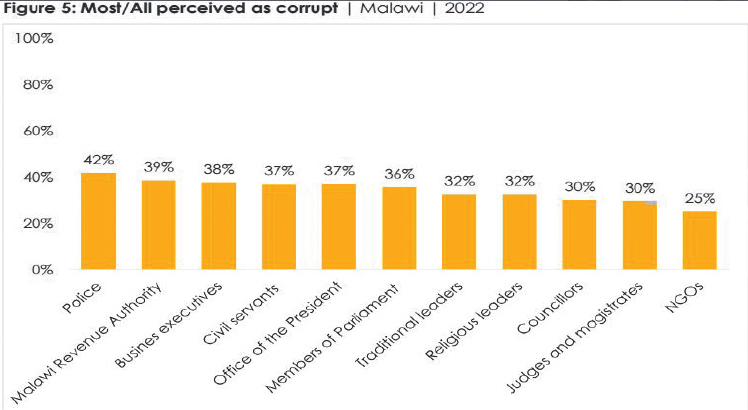Corruption levels worsen—survey
Two thirds of Malawians perceive corruption levels to have increased in the past year and find government’s commitment to fight the vice wanting, an Afrobarometer survey has revealed.
Presenting the findings in Lilongwe yesterday on behalf of the pan-African non-partisan survey research network that provides data on African experiences and evaluations of democracy, governance and quality of life which works with the University of Malawi’s Centre for Social Research (CSR), the centre’s head Joseph Chunga said 66 percent of Malawians hold the view that corruption has worsened under the Tonse Alliance administration compared to the period its predecessor Democratic Progressive Party (DPP) was in charge.
He said: “We had that particular question, whether people think now the government is doing much better or worse than the time of the DPP. The results are that 57 percent of Malawians think that this government is doing worse than the previous regime.”

The research, according to the Afrobarometer team, interviewed a nationally representative sample of 1 200 adult Malawians in February 2022. In the past 20 years, the surveys have been conducted eight times.
The 66 percent of Malawians thinking that corruption has worsened is slightly lower than respondents to the 2020 survey which documented that 66.9 percent believed that corruption had increased in 2019.
The findings also revealed that citizens view Malawi Police Service as the most corrupt institution followed by Malawi Revenue Authority (MRA).
Summarising the results in a news release, the Afrobarometer team said the outcomes should be a wake-up call to the current administration.
Reads the statement in part: “For a government that campaigned on zero tolerance for corruption and a country badly in need of resources to improve service delivery, these findings represent a renewed call to action.”Supporting the outcomes’ credibility, the team said in the results summary: “A sample of this size yields country-level results with a margin of error of plus or minus-three percentage points at a 95 percent confidence level.”
On corruption, the research centred on how free Malawians are to report graft, proposals to grant amnesty to corrupt entities and the rate and handling of top government officials involved in the malpractice.
The report reads on its findings: “Two-thirds [66 percent] of citizens say the government is performing ‘fairly badly’ or ‘very badly’ at fighting corruption. Two-thirds [66 percent] of Malawians say that corruption has increased over the past year, including 57 percent who say it has increased a lot.”
Topping the list of officials embroiled in corruption, the report found that “more than eight in 10 Malawians [83 percent] agree with the idea that Cabinet ministers and government officials charged with corruption should be fired immediately.”
The report adds: “However, 57 percent of respondents say suspects who refund proceeds from corruption should be granted amnesty.”
The research further established that “almost eight in 10 Malawians [78 percent] say people risk retaliation or other negative consequences if they report corruption to the authorities.”
At institutional level, the police is perceived to be the most corrupt with 42 percent of Malawians holding that view. Next is MRA at 39 percent, business executives are third with 38 percent civil servants and the Office of the President and Cabinet tie on fourth with 37 percent while members of Parliament come fifth with 36 percent.
Reacting to the findings, National Anti-Corruption Alliance, a consortium of civil society organisations including Malawi Law Society, said the perceptions established by the survey reflect the reality on the ground.
Speaking in an interview yesterday, the alliance’s chairperson Moses Mkandawire said: “Nowadays there is serious and organised corruption. This malpractice is not just about embezzling public resources. It is also to do with political patronage, where you talk about selection of people into selected positions.”
He said corruption is negatively affecting poor Malawians and that this was the reason the country is lagging behind in development.
Said Mkandawire: “What is needed is for government to protect these little resources. Additionally, we need to establish a special court to deal with fraud and corruption.”
Catholic Commission for Justice and Peace (CCJP) national governance programmes coordinator George Chiusiwa, who was present during the presentation of the report, has since asked government to treat the findings with seriousness.
Minister of Information and Digitisation Gospel Kazako, who is also the official government spokesperson, attributed the negative perception on corruption to inadequate information to the public.
He said: “Afrobarometer was dealing with the perception of the people on the fight we have embarked on against corruption. It is, therefore, not appropriate for us to reject or accept the results because doing so will be closing the gap between perception and reality.
Kazako said government was still committed towards the fight against corruption through support for the Anti-Corruption Bureau (ACB).
He said: “It is during President [Lazarus] Chakwera’s reign that the ACB director general madam Martha Chizuma got a global recognition for her work. This is because of the support she receives from government to do her work freely and independently.
Malawi climbed 19 places on the 2021 Transparency International Corruption Perception Index (CPI), according to rankings released in January this year.





